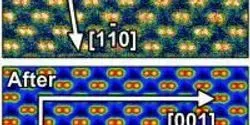All by North Carolina State University
Filter by
AllArticlesAudioEbooksEventsInfographicsNewsProductsSurveysDocumentsVideosVirtual EventsWebinars
New research from North Carolina State University and the University of Minnesota shows that the majority of consumers will accept the presence of nanotechnology or genetic modification (GM) technology in foods – but only if the technology enhances the nutrition or improves the safety of the food.

Biomedical engineering researchers have developed a drug delivery system consisting of nanoscale “cocoons” made of DNA that target cancer cells and trick the cells into absorbing the cocoon before unleashing anticancer drugs. The work was done by researchers at North Carolina State University and the University of North Carolina at Chapel Hill.

Researchers from North Carolina State University, Duke University and the University of Copenhagen have created the world’s largest DNA origami, which are nanoscale constructions with applications ranging from biomedical research to nanoelectronics.

New research from North Carolina State University finds that young people who have had mentors are more likely to find work early in their careers that gives them more responsibility and autonomy – ultimately putting them on a path to more financially and personally rewarding careers.

Scientists from North Carolina State University and the University of Florida have combined cookies, citizen science and robust research methods to track the diversity of ant species across the United States, and are now collaborating with international partners to get a global perspective on how ants are moving and surviving in the modern world.

New research from North Carolina State University and UNC-Chapel Hill reveals that energy is transferred more efficiently inside of complex, three-dimensional organic solar cells when the donor molecules align face-on, rather than edge-on, relative to the acceptor. This finding may aid in the design and manufacture of more efficient and economically viable organic solar cell technology.

Researchers from North Carolina State University have developed a new technique that uses existing technology to allow researchers and natural resource managers to collect significantly more information on water quality to better inform policy decisions.

When capturing images at the atomic scale, even tiny movements of the sample can result in skewed or distorted images – and those movements are virtually impossible to prevent. Now microscopy researchers at North Carolina State University have developed a new technique that accounts for that movement and eliminates the distortion from the finished product.













